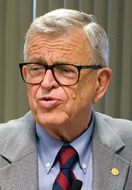
by Chuck Colson –
At the recently concluded meeting of the American Economic Association, the most contentious issue had nothing to do with economics, per se. It wasn’t about “the economics of the organic food system,” or “the costs and benefits of pollution control,” as two of the seminars were labeled.
No, the behavior drawing the most attention, both inside and outside the profession, was ethics — or more to the point, the lack of ethics — of economists themselves.
According to a recent article in Slate magazine, the call of for a “code of ethical standards” comes in the wake of series of “blows to the prestige of the profession.” These include “housing crisis, the credit crunch, the financial crisis, the recession, the collapse of several European economies, and the overhaul of U.S. banking regulation.”
The issue isn’t that economists, by and large, were wrong about all of these things. The problem that prompted the call for a code of ethics is that economists weren’t leveling with the public.
A case in point is the subject of a new documentary about the financial crisis entitled “Inside Job.” The film tells the story of Frederic Mishkin, a former member of the Fed’s Board of Governors. A few years ago, Mishkin wrote a paper praising Iceland’s “regulatory and banking systems.” Shortly after the paper was published, the system collapsed.
The problem isn’t that he was wrong — it’s that Mishkin didn’t disclose that he was paid $124,000 by Iceland’s Chamber of Commerce to write the paper. Such a disclosure would have helped people decide what to make of his conclusions. Without it, all they knew was that a prestigious economist had given Iceland his seal of approval.
The Mishkin story isn’t unique: Reuters did a study of economists’ testimony before Congress and found that one-third of the time, they failed to disclose financial relationships with companies who would be affected by the legislation under consideration.
The negative attention prompted 300 economists, including Mishkin, to call for an official Code of Ethics that would include, among other things, disclosure requirements.
Given the influence wielded by economists, especially in government, disclosure makes sense.
Still, you shouldn’t confuse a code of ethics with being ethical. Codes like the one being proposed for economists are about appearances. The goal is to reassure those outside the profession. Stated bluntly, the goal isn’t so much to promote honesty as it is avoiding giving people reason to question your honesty.
Ethics, since the time of Aristotle, has been about the promotion of virtue. It is about answering the question “how now shall we live?” Answering this question requires asking and answering other such as “what is the nature and purpose of human life?”
In the end, ethics isn’t a merely an intellectual exercise, never mind a public-relations one. Rather, it’s an attempt to become good.
HT: BreakPoint
